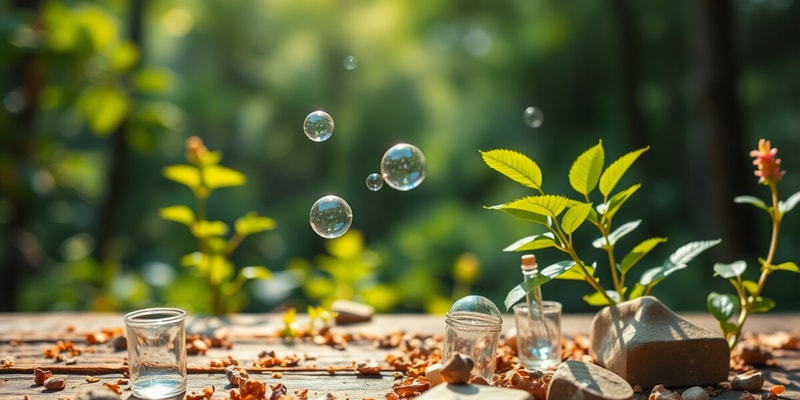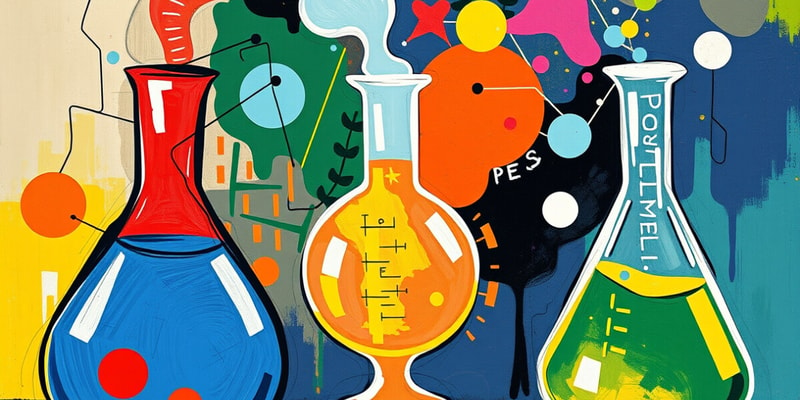Podcast
Questions and Answers
What is the independent variable in the experiment?
What is the independent variable in the experiment?
What is the dependent variable in the experiment?
What is the dependent variable in the experiment?
What trend can be observed in the average length of tunnels in light conditions over time?
What trend can be observed in the average length of tunnels in light conditions over time?
Which of the following could be considered a control in the experiment?
Which of the following could be considered a control in the experiment?
Signup and view all the answers
Which type of graph would be most appropriate to display the data collected?
Which type of graph would be most appropriate to display the data collected?
Signup and view all the answers
On Day 21, what was the length of tunnels constructed in the dark condition?
On Day 21, what was the length of tunnels constructed in the dark condition?
Signup and view all the answers
How does the average length of tunnels in dark conditions compare to those in light conditions by Day 21?
How does the average length of tunnels in dark conditions compare to those in light conditions by Day 21?
Signup and view all the answers
Which characteristic is NOT shared by living organisms?
Which characteristic is NOT shared by living organisms?
Signup and view all the answers
What is the primary goal of science?
What is the primary goal of science?
Signup and view all the answers
What is a hypothesis?
What is a hypothesis?
Signup and view all the answers
In a controlled experiment, what is the role of the control group?
In a controlled experiment, what is the role of the control group?
Signup and view all the answers
What does the independent variable represent in an experiment?
What does the independent variable represent in an experiment?
Signup and view all the answers
What is the first step in the scientific method?
What is the first step in the scientific method?
Signup and view all the answers
What is an inference?
What is an inference?
Signup and view all the answers
What genetic molecule is common to all living things?
What genetic molecule is common to all living things?
Signup and view all the answers
Why is it important to control variables in an experiment?
Why is it important to control variables in an experiment?
Signup and view all the answers
Which process enables living things to survive changing conditions?
Which process enables living things to survive changing conditions?
Signup and view all the answers
What should scientists do after collecting and analyzing data?
What should scientists do after collecting and analyzing data?
Signup and view all the answers
Living things respond to different types of what?
Living things respond to different types of what?
Signup and view all the answers
What kind of change does evolution represent for living things?
What kind of change does evolution represent for living things?
Signup and view all the answers
Life continuation depends on which types of reproduction?
Life continuation depends on which types of reproduction?
Signup and view all the answers
What maintains a relatively stable internal environment in living organisms?
What maintains a relatively stable internal environment in living organisms?
Signup and view all the answers
Which statement best describes the relationship among living things?
Which statement best describes the relationship among living things?
Signup and view all the answers
Which of the following best defines science in the context of understanding life?
Which of the following best defines science in the context of understanding life?
Signup and view all the answers
What is ecology primarily concerned with?
What is ecology primarily concerned with?
Signup and view all the answers
Which of the following correctly defines a biome?
Which of the following correctly defines a biome?
Signup and view all the answers
What characterizes autotrophs in an ecosystem?
What characterizes autotrophs in an ecosystem?
Signup and view all the answers
Which of the following is an example of an abiotic factor?
Which of the following is an example of an abiotic factor?
Signup and view all the answers
In ecological research, which method involves direct observation of organisms?
In ecological research, which method involves direct observation of organisms?
Signup and view all the answers
What distinguishes consumers from producers in an ecosystem?
What distinguishes consumers from producers in an ecosystem?
Signup and view all the answers
Which of the following levels of ecological organization is comprised of multiple species in a shared area?
Which of the following levels of ecological organization is comprised of multiple species in a shared area?
Signup and view all the answers
Which process involves autotrophs converting light energy into food?
Which process involves autotrophs converting light energy into food?
Signup and view all the answers
What is the role of lysosomes in a cell?
What is the role of lysosomes in a cell?
Signup and view all the answers
Which organism is classified as a primary producer in the food chain provided?
Which organism is classified as a primary producer in the food chain provided?
Signup and view all the answers
What happens to the food chain if the shark population declines significantly?
What happens to the food chain if the shark population declines significantly?
Signup and view all the answers
Which organelle is responsible for protein synthesis in a cell?
Which organelle is responsible for protein synthesis in a cell?
Signup and view all the answers
What is the difference between rough ER and smooth ER?
What is the difference between rough ER and smooth ER?
Signup and view all the answers
Which of the following is NOT a function of the central vacuole in plant cells?
Which of the following is NOT a function of the central vacuole in plant cells?
Signup and view all the answers
Which of the following correctly matches the organism to its trophic level?
Which of the following correctly matches the organism to its trophic level?
Signup and view all the answers
What is the primary function of the Golgi apparatus?
What is the primary function of the Golgi apparatus?
Signup and view all the answers
What name is given to the rules governing the pairing of nitrogenous bases in DNA?
What name is given to the rules governing the pairing of nitrogenous bases in DNA?
Signup and view all the answers
Which type of bond primarily holds the two strands of DNA together?
Which type of bond primarily holds the two strands of DNA together?
Signup and view all the answers
Which of the following components do nucleotides NOT contain?
Which of the following components do nucleotides NOT contain?
Signup and view all the answers
Which scientist's work involved X-ray diffraction studies leading to the discovery of the double helix structure of DNA?
Which scientist's work involved X-ray diffraction studies leading to the discovery of the double helix structure of DNA?
Signup and view all the answers
If the base sequence on a separated strand of DNA is CGTAGG, what will the base sequence of its complementary strand be?
If the base sequence on a separated strand of DNA is CGTAGG, what will the base sequence of its complementary strand be?
Signup and view all the answers
Why can the nucleotides in DNA be joined in any order?
Why can the nucleotides in DNA be joined in any order?
Signup and view all the answers
Which nitrogenous bases pair together in DNA?
Which nitrogenous bases pair together in DNA?
Signup and view all the answers
What is the primary function of the hydrogen bonds in DNA?
What is the primary function of the hydrogen bonds in DNA?
Signup and view all the answers
Study Notes
Introduction to Science
- Science is an organized way of gathering and analyzing evidence about the natural world.
- Science seeks natural explanations for events
- Science utilizes evidence, not belief
- Science is different from other human endeavors as it focuses on the natural world only.
- Observations are made to describe and notice patterns and events, to further deduce inferences.
Scientific Method
- Observation- Noticing and describing events or processes with careful attention to detail.
- Inference- Logical interpretation of observations based on existing knowledge.
- Hypothesis- Proposed scientific explanation for observations, testable by design experiments.
- Controlled Experiment- Experiment where only one variable is manipulated or 'changed' (independent variable), while others are kept constant. The controlled variable not affected by the independent variable is called the control group.
- Dependent variable- Variable that changes in response to the independent variable.
- Collecting, recording, and analyzing data- gathering information and evaluating changes.
- Drawing conclusions- Analyzing data to support or reject hypothesis. Sharing conclusions with others
- Scientific Methodology for investigations depends on organized observation, and inference followed by a hypothesis that can be tested, either supporting or rejecting/refuting the hypothesis.
- Experiments are used to test hypotheses
- The goal is to gather data and draw valid conclusions, to further develop the scientific understanding of the world.
Example Experiment: Ant Tunnels
-
Hypothesis: Ants dig more tunnels in the dark.
-
Experimental design (Components):
-
Ant colonies were carefully controlled in setup.
-
Same number and type of ants per colony
-
Identical amount of food per group
-
Same temperature in each colony
-
Light exposure conditions were controlled for two sets of 5 colonies: exposed to light and darkness.
-
Tunnels measurements were computed regularly to observe the trend.
-
Independent Variable: Light conditions (light vs. dark)
-
Dependent Variable: Length of tunnels
-
Control Groups: The colonies exposed to light (control)
-
-
Constants: The independent variable being controlled, amount of food, colony size, temperature, and types of ants.
-
Data Collection: Length of tunnels is measured over several days and averaged.
-
Drawing Conclusions (Data Interpretation): Analyze the data to see which light condition supported the hypothesis. Are the averages different? Was there a trend?
-
This experiment seeks to establish correlation between the occurrence of light or darkness and ants tunnel behavior/activity. The expected output should show either an increase or decrease in tunnel length in response to light condition, to support or reject the hypothesis respectively.
Studying That Suits You
Use AI to generate personalized quizzes and flashcards to suit your learning preferences.
Related Documents
Description
Explore the basics of science and the scientific method in this quiz. Understand key concepts including observation, inference, hypothesis, and controlled experiments. Test your knowledge of how scientists gather and analyze evidence to explain natural phenomena.




